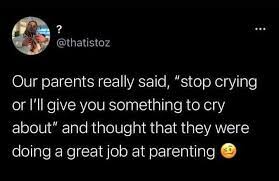Inspired by an article I read one weekend, it is time to acknowledge an issue growing with each passing day. In addition to the article I read, many memes depict precisely what this generation of adult children has endured. It’s finally being brought to light about all of it.

Our generation was constantly threatened to stuff our emotions, not acknowledge them, and expect to move on with everything else in life with ease. The crazy part of this is that, of course, this isn’t our parents’ fault… or maybe it is, but it brings a new light to the discussion on intergenerational trauma. Before I go any further, this discussion is, in no way, meant to villainize any particular parent. The purpose is to bring awareness to a type of emotional abuse that parents have consistently gotten away with under the guise of ‘parenting.’ Changes need to happen now so we can avoid the mental and emotional issues our generation is having during future generations.
Reasons for Estrangement
There are many reasons why people may want to distance themselves from their parents. It could be as small as a particular scenario that threw everything out of sync, or a multitude of details that created trauma well into an individual’s adulthood. Let’s break it down into some examples.
When parents get divorced (and remarkably when one or both parents get remarried), this can create tension between the parents, affecting the children. As a child of divorce myself, it doesn’t matter if the intention is pure and one parent wants to create a positive communicative environment; if all parents are not on the same page, there will always be tension. Words are spoken that cannot be taken back, and these things will be remembered. Additionally, when divorces happen, the quality of the connection between the parents (and between the children and parents) ends up breaking down. When we look at Maslow’s Hierarchy of Needs, we see how important the feeling of safety is to children. When there are relationship breakdowns, this creates insecure attachments where safety was needed the most.
In some cases, individuals already felt estranged before distancing themselves from their parents or family, especially if there were already interpersonal conflict. It can be a minor conflict that seems to never resolve and can fester into a more significant issue for an individual. This rejection becomes internalized, causing trauma. General feelings of loss, grief, and trauma will spur estrangement if not appropriately handled.
When issues come about, and they are constantly happening or unacknowledged, or even denied, it begins an uphill battle for individuals.
But What Does Estrangement Do?
First, familial estrangement, parental estrangement, etc, is a complex process of personal transition and continual adjustment – it takes negotiating intrapersonal, interpersonal, social, and symbol distance. However, estrangement has downsides if an individual is not apt to do the mental health work. Unresolved familial issues can end up affecting future relationships whether they are romantic, platonic, professional, etc. Dating can ease the stress of familial issues, but it can create co-dependence by centering everything on a relationship and setting unrealistic expectations. Estrangement can also cause loss of support such as financial, physical, etc.
Simply Explained
When a sense of disconnection and rejection develops in childhood or adolescence, they show a stable tendency to overvalue relationships/connections or avoid interpersonal relationships altogether. This causes defensive posturing and emotional withdrawal. This is why mental health and therapy are so important. Estrangement doesn’t have to be permanent, but it can be beneficial if an individual finds themselves in a seemingly endless emotional cycle.
